Exam 5: Alkenes: Structure,nomenclature,and an Introduction to Reactivity - Thermodynamics and Kinetics
Exam 1: Remembering General Chemistry: Electronic Structure and Bonding90 Questions
Exam 2: Acids and Bases: Central to Understanding Organic Chemistry43 Questions
Exam 3: An Introduction to Organic Compounds: Nomenclature, physical Properties, and Structure136 Questions
Exam 4: Isomers: the Arrangement of Atoms in Space125 Questions
Exam 5: Alkenes: Structure,nomenclature,and an Introduction to Reactivity - Thermodynamics and Kinetics84 Questions
Exam 6: The Reactions of Alkenes - the Stereochemistry of Addition Reactions89 Questions
Exam 7: The Reactions of Alkynes - Introduction to Multistep Synthesis124 Questions
Exam 8: Delocalized Electrons: Their Effect on Stability, pka, and the Products of a Reaction - Aromaticity and Electronic Effects: an Introduction to the Reactions of Benzene185 Questions
Exam 9: Substitution and Elimination Reactions of Alkyl Halides228 Questions
Exam 10: Reactions of Alcohols, ethers, epoxides, amines and Sulfur-Containing Compounds109 Questions
Exam 11: Organometallic Compounds65 Questions
Exam 12: Radicals141 Questions
Exam 13: Mass Spectrometry,infrared Spectroscopy,and Uvvis Spectroscopy140 Questions
Exam 14: Nmr Spectroscopy122 Questions
Exam 15: Reactions of Carboxylic Acids and Carboxylic Acid Derivatives126 Questions
Exam 16: Reactions of Aldehydes and Ketones122 Questions
Exam 17: Reactions at the Α-Carbon121 Questions
Exam 18: Reactions of Benzene and Substituted Benzenes168 Questions
Exam 19: More About Amines - Reactions of Heterocylic Compounds126 Questions
Exam 20: The Organic Chemistry of Carbohydrates110 Questions
Exam 21: Amino Acids,peptides,and Proteins117 Questions
Exam 22: Catalysis in Organic Reactions and in Enzymatic Reactions92 Questions
Exam 23: The Organic Chemistry of the Coenzymes, compounds Derived From Vitamins102 Questions
Exam 24: The Organic Chemistry of the Metabolic Pathways90 Questions
Exam 25: The Organic Chemistry of Lipids37 Questions
Exam 26: The Chemistry of the Nucleic Acids94 Questions
Exam 27: Synthetic Polymers116 Questions
Exam 28: Pericyclic Reactions102 Questions
Select questions type
Identify the nucleophiles and electrophiles.
-OH,BH3,H2O,+CH3,NH3,Br-
(Essay)
4.8/5  (32)
(32)
Provide the systematic name of the compound shown below.Make sure to include the E or Z designator if necessary. 
(Short Answer)
4.9/5  (38)
(38)
Consider the reaction coordinate diagram shown.What is the rate-determining step in the conversion of A to G? 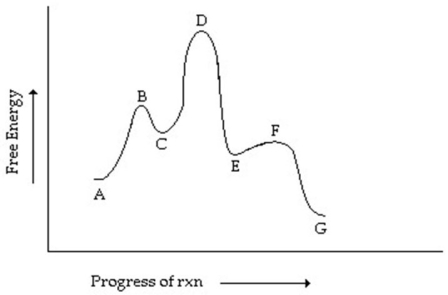
(Short Answer)
4.8/5  (31)
(31)
Consider the one-step conversion of F to G.Given that the reaction is endergonic by 5 kcal/mol and that the energy difference between G and the transition state for the process is 15 kcal/mol,sketch a reaction-energy profile for this reaction.Make sure to show how the given energy differences are consistent with your sketch.
(Essay)
4.7/5  (41)
(41)
Consider the reaction coordinate diagram shown.Which step has the greatest activation energy? 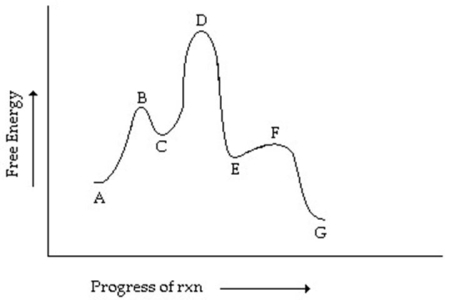
(Multiple Choice)
4.9/5  (37)
(37)
Consider the conversion of C to D via a one-step mechanism.The activation energy of this conversion is 3 kcal/mol.The energy difference between D and the transition state of the reaction is 7 kcal/mol.Estimate ΔH° for the reaction C → D.
(Short Answer)
4.8/5  (44)
(44)
Consider the reaction coordinate diagram shown.Which step has the greatest rate constant in the forward direction? 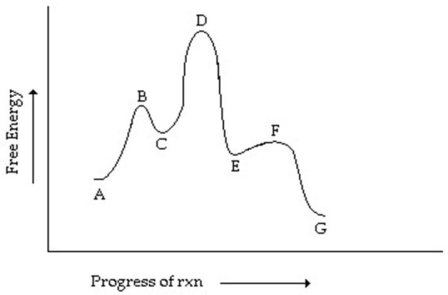
(Short Answer)
4.8/5  (35)
(35)
What is the activation energy for the reaction B → A in the following diagram? 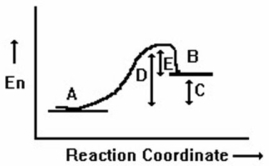
(Multiple Choice)
4.9/5  (41)
(41)
An increase in which of the following will occur if the reaction temperature is increased? I.Energy of activation
II)Collision frequency
III)Fraction of collisions with sufficient energy
(Multiple Choice)
4.7/5  (38)
(38)
Based on the following energy diagram,which compound,A or C,is formed faster from B? Which is more stable,A or C? Explain. 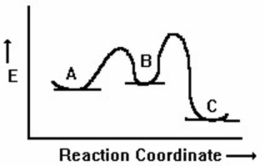
(Essay)
5.0/5  (39)
(39)
Which of the following correctly describes the reaction shown? 
(Multiple Choice)
4.9/5  (32)
(32)
How many carbons are in the planar double-bond system of 3-methylcyclopentene?
(Multiple Choice)
4.8/5  (41)
(41)
Calculate the enthalpy for the following reaction. 
 H-Cl,103 kcal/mole
CH3CH2-H,101 kcal/mole
CH3CH2-Cl,85 kcal/mole
H-Cl,103 kcal/mole
CH3CH2-H,101 kcal/mole
CH3CH2-Cl,85 kcal/mole
(Short Answer)
4.8/5  (32)
(32)
Which of the following statements about propene,CH3CH  CH2,is correct?
CH2,is correct?
(Multiple Choice)
4.8/5  (37)
(37)
Showing 21 - 40 of 84
Filters
- Essay(0)
- Multiple Choice(0)
- Short Answer(0)
- True False(0)
- Matching(0)